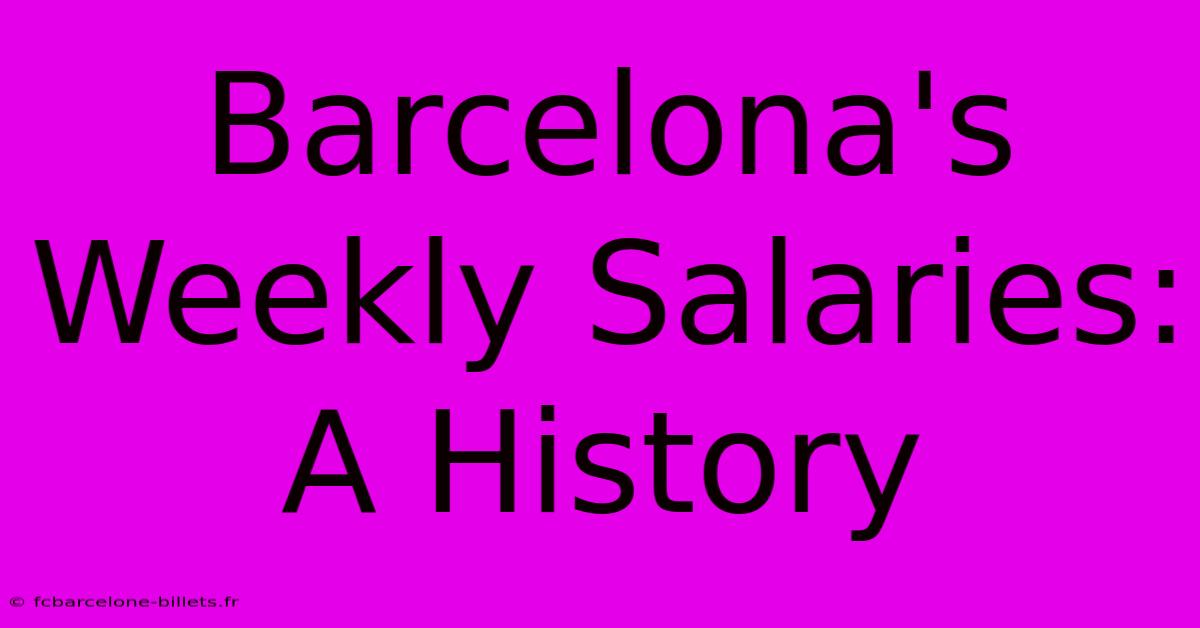Barcelona's Weekly Salaries: A History

Table of Contents
Barcelona's Weekly Salaries: A Historical Overview
Barcelona, a city renowned for its vibrant culture, stunning architecture, and world-class football club, boasts a fascinating history interwoven with the evolution of its weekly salaries. Understanding this history provides valuable insights into the city's economic development and social changes. This article delves into the evolution of Barcelona's weekly salaries, exploring key periods and influencing factors.
The Early Years: Pre-Industrial Revolution Barcelona
Before the Industrial Revolution, Barcelona's economy was largely agrarian and reliant on trade. Weekly salaries, if one could even speak of a consistent weekly payment, were highly variable and depended heavily on seasonal work and individual bargaining power. Agricultural laborers and skilled artisans formed the majority of the workforce, with their earnings fluctuating based on harvests and demand for their crafts. There were significant disparities in income, with a small wealthy elite contrasting sharply with a large impoverished population. Precise figures for weekly wages are scarce for this period, but accounts suggest a meager existence for the vast majority.
The Impact of Industrialization (Late 19th & Early 20th Centuries)
The late 19th and early 20th centuries witnessed a dramatic transformation in Barcelona's economy. The Industrial Revolution brought factories, mass production, and a burgeoning urban population. This period saw the rise of industrial workers, earning wages significantly higher than their agricultural counterparts, although still often inadequate. Textile mills, shipyards, and other industries fueled economic growth, but also led to harsh working conditions and social inequalities. The growth of labor unions and social movements fought for better wages, working conditions, and social reforms, resulting in gradual improvements in workers' weekly salaries.
The Franco Regime and its Influence (Mid-20th Century)
The Franco dictatorship (1939-1975) significantly impacted Barcelona's economy and social fabric. Strict government control suppressed labor movements and wage negotiations, resulting in suppressed wages and limited opportunities for workers. While precise weekly salary data for this era is challenging to obtain due to restrictions, it's clear that real wages struggled to keep pace with inflation, leaving many Barcelonians in precarious economic situations.
Post-Franco Era and the Rise of Tourism (Late 20th & Early 21st Centuries)
After Franco's death, Spain transitioned to democracy, and Barcelona experienced rapid economic growth. The city's transformation into a major tourist destination created numerous jobs across various sectors – hospitality, tourism services, and retail. This boosted weekly salaries in certain sectors, although income inequality persisted. The city's economic diversification, fueled by technological advancements and entrepreneurial spirit, further contributed to salary growth, yet also created a higher cost of living.
The 21st Century: Globalization and the Digital Economy
The 21st century has seen Barcelona integrate deeply into the global economy. The growth of the digital economy and technology sector has created high-paying jobs, increasing the average weekly salary in the city. However, this growth has not been evenly distributed, leading to persistent challenges related to affordable housing and income inequality. The city continues to grapple with balancing economic progress with social equity.
Conclusion: A Continuous Evolution
Barcelona's weekly salaries have undergone a dramatic transformation throughout its history, reflecting the city's complex economic and social evolution. From the meager wages of pre-industrial times to the varied income levels of the modern era, Barcelona's salary landscape tells a story of progress, struggle, and ongoing adaptation in a rapidly changing world. Understanding this history provides a crucial context for analyzing current economic trends and addressing ongoing social challenges. Further research into specific industries and occupational groups within each historical period would offer a more detailed understanding of this fascinating economic journey.

Thank you for visiting our website wich cover about Barcelona's Weekly Salaries: A History. We hope the information provided has been useful to you. Feel free to contact us if you have any questions or need further assistance. See you next time and dont miss to bookmark.
Featured Posts
-
Own A Piece Of Football History Messi S 2018 Jersey
Mar 13, 2025
-
Delicious Barcelona Menu Del Dia Discoveries
Mar 13, 2025
-
Real Madrids Path To Victory Over Barcelona
Mar 13, 2025
-
Barcelonas Gamble On Leao Will It Pay Off
Mar 13, 2025
-
July In Barcelona A Budget Friendly Adventure
Mar 13, 2025
